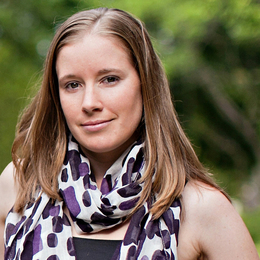
Defying History
Jenni L. Walsh, a writer of historical novels featuring strong female characters, tells stories the history books have largely overlooked.
“Choose a job you love and you will never have to work a day in your life.”
Jenni L. Walsh can certainly relate to this truism. She spends her days—and, more often, her nights—in the glow of her computer, dreaming up vivid characters and the tribulations those characters need to grow, learn, and change the world around them.
Walsh, a Chester County native who now lives in Yardley, once enjoyed a fruitful career as a copywriter in New York and wrote fiction in her spare time. Now she writes novels for a living. Her specialty: historical fiction starring strong female protagonists. In recent years, for example, her novels Side by Side and Becoming Bonnie delved into the largely untold story of Bonnie Parker, of the infamous tandem Bonnie and Clyde.
She penned her latest book, I Am Defiance, about a young girl trying to find her way in Adolf Hitler’s Germany, for middle-grade readers. We spoke with Walsh about her new novel, the kinds of stories that interest her, and the importance of remembering our past.
Q&A
I Am Defiance is about a young girl named Brigitte who comes of age in Nazi Germany. What did you like most about this character?
Brigitte is only 12 at the outset of the novel. … She’s almost living in this bubble, even as she’s surrounded by all this hate and wrongdoing and persecution. Her eyes are slowly opened. Her sister [Angelika] contracts polio, which the family tries to hide. Then the family receives leaflets from a resistance group called the White Rose, which could endanger the family because, at this time, anyone who received these leaflets could be considered sympathetic [to the resistance]. It’s hard for her to learn about the resistance and the terrible things her country has done when she’s been living in this sheltered bubble. She begins to learn that everything she has been taught was completely false.
Kids today can relate to that. As we get to middle school, our bubbles start to expand. Even as Brigitte’s eyes are opening and her bubble is bursting, it’s great for her to have an older sister and dad to help educate her in things like kindness and taking a stand.
Why is it important for young minds to read stories like this?
It’s important for today’s kids to see other children their age being kind to people who aren’t like them and who others may be putting down. The Holocaust is a very elevated situation compared to what kids experience today. The fact that Brigitte makes positive choices to help other people, it’s important for kids to see that. I hope her choices inspire others to do the same.
The White Rose was a real-life resistance group composed primarily of students. One student, Sophie Scholl, led the movement. She was very young, so I think it’s very inspiring for children to see other kids not much older than themselves making a big difference in the world. Sophie sacrificed a lot for the White Rose, including her life.
It’s not your first time writing about the Second World War (Hettie and the London Blitz: A World War II Survival Story). Do you have a particular interest in this time in world history?
I am interested in a lot of history in general. My husband is a history buff, too, so we have that in common. I find World War II to be endlessly interesting. We question how something like the Holocaust could ever happen, and it makes us question if it could ever happen again. It’s one reason we need these kinds of books, to shine a spotlight on our past; the next generation can’t imagine that such bad things happened and doesn’t think it is possible to repeat. Jewish people [during the Holocaust] were compared to fleas and called subhuman. I told my daughter about this and she was baffled.
Your novels are rooted in historical fiction—particularly women and girls in historical fiction. Bonnie Parker is one example. Why do you want to tell these kinds of stories?
I am definitely interested in women who haven’t yet had a strong voice. We’ve heard Bonnie’s story before—the film, the miniseries—but it’s always told from the perspective of Clyde; she always gets lumped in with him. Her story that we’ve been told is so far from real life. I almost wanted to right the wrongs that have been said about her, not that she was an innocent. She made some terrible decisions, but there are also things about her that haven’t been accurately portrayed.
What led you down the path to being a writer?
I have two young children, now ages seven and five, and it was too much to do a 40-hour workweek of copywriting and taking care of the children. I enjoy telling stories, and I love the freedom. I’m happiest when I’m sitting down at the computer and doing what I love. When it comes to children and novel writing, normally I work at night when everyone is asleep. My daughter jokes that I’m a vampire.
Photograph by April Ziegler
Published (and copyrighted) in Suburban Life magazine, February 2021.


